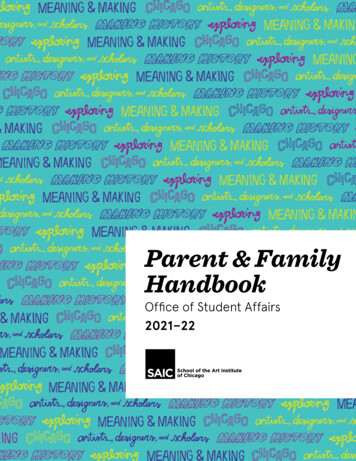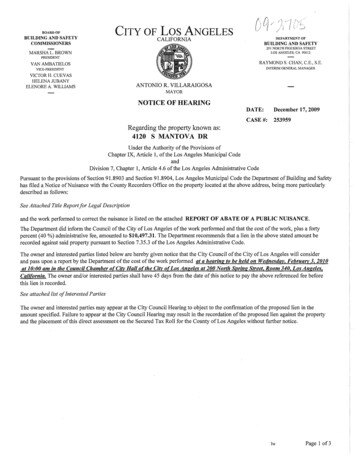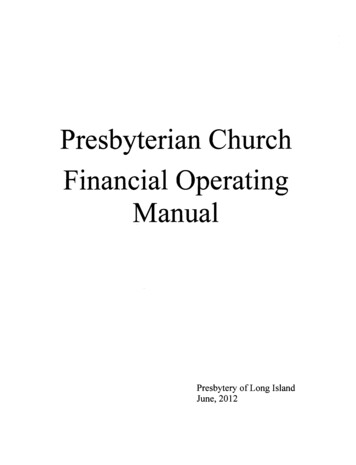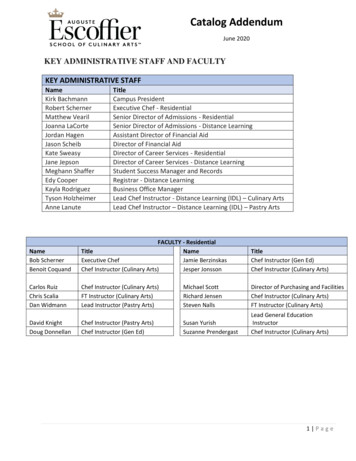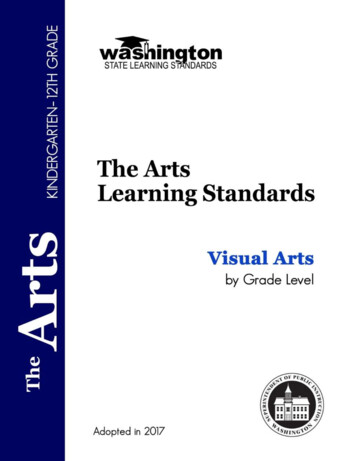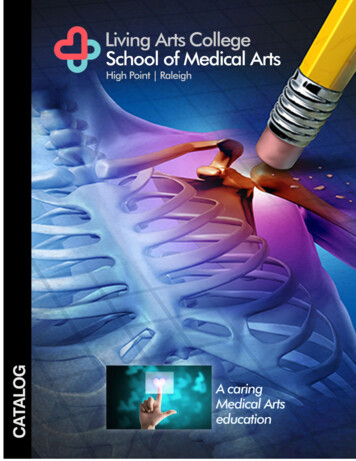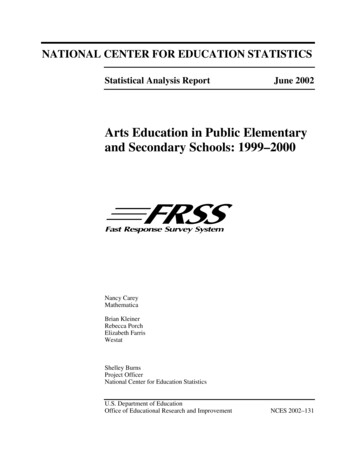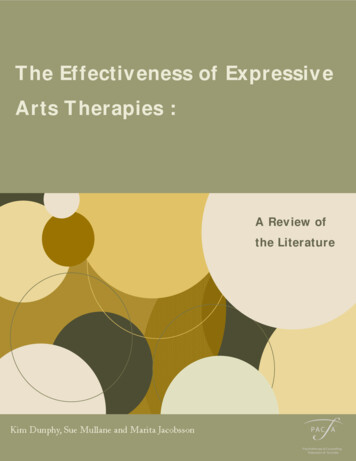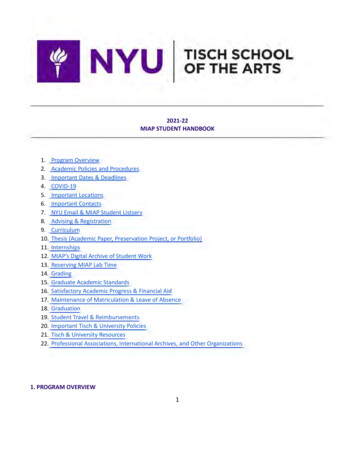
Transcription
YUTISCH SCHOOLOFTHE,ARTS2021-22MIAP STUDENT 18.19.20.21.22.Program OverviewAcademic Policies and ProceduresImportant Dates & DeadlinesCOVID-19Important LocationsImportant ContactsNYU Email & MIAP Student ListservAdvising & RegistrationCurriculumThesis (Academic Paper, Preservation Project, or Portfolio)InternshipsMIAP’s Digital Archive of Student WorkReserving MIAP Lab TimeGradingGraduate Academic StandardsSatisfactory Academic Progress & Financial AidMaintenance of Matriculation & Leave of AbsenceGraduationStudent Travel & ReimbursementsImportant Tisch & University PoliciesTisch & University ResourcesProfessional Associations, International Archives, and Other Organizations1. PROGRAM OVERVIEW1
The Moving Image Archiving and Preservation (MIAP) Program (@NYUMIAP on Twitter, Instagram, and Facebook)provides an interdisciplinary course of study that trains future professionals to manage, archive, and preservecollections of film, video, digital, and multimedia works. The program provides an international, comprehensiveeducation in the theories, methods, and practices of moving image archiving and preservation. MIAP’scurriculum includes courses on media handling and inspection; conservation and preservation; collectionmanagement; moving image metadata; copyright and legal issues; curatorial work; the cultures of museums,archives, and libraries; and the histories of cinema and television.MIAP takes full advantage of the New York City area, giving students the opportunity to work with local archives,museums, libraries, labs, and arts organizations. Although the program trains students to deal with all types ofmoving image material in diverse settings, it pays special attention to challenges posed by works that have noinstitutional stewardship (e.g., independent, avant-garde, and documentary films; orphan works;non-institutional websites). The program also addresses the ties between archival practice and scholarlyresearch.MIAP is a two-year, full-time Master of Arts (MA) degree program situated within New York University’sDepartment of Cinema Studies. The Department also awards BA, MA, and PhD degrees in Cinema Studies and,jointly with NYU’s Department of Anthropology, a Certificate in Culture and Media for PhD candidates inAnthropology, Cinema Studies, and Comparative Literature.The Department of Cinema Studies is part of the Kanbar Institute of Film & Television in NYU’s Tisch School of theArts. The MIAP MA and Cinema Studies MA are conferred by NYU’s Tisch School of the Arts (TSOA); the CinemaStudies MA, PhD, and Certificate are conferred by NYU’s Graduate School of Arts and Science (GSAS).2. ACADEMIC POLICIES & PROCEDURESMIAP students should refer to this handbook as well as the TSOA Policies and Procedures Handbook for matterssuch as academic standards, grading policies, registration regulations, and degree requirements. Any questionsnot answered in these handbooks should be addressed to MIAP ‘s Director (Juana Suárez, juana@nyu.edu) andAcademic Program Manager (Jess Cayer, tisch.preservation@nyu.edu). Should a mid-year edit to these policiesresult in edits to this Handbook, a notice will be sent to students via their NYU email regarding the updates.3. IMPORTANT DATES & DEADLINESPrior to the start of each semester, MIAP staff will share a list of important dates and deadlines for the upcomingterm. This is an active list that may expand over the course of the semester as needed. Deadlines related toregistration and payment are derived from the University Registrar’s academic calendar and the Bursar’s website.Students should familiarize themselves with both MIAP’s list of important dates and the University-wideresources mentioned above.4. COVID-19 - Fall 2021As you will note from the NYU Returns page, we will be back fully in person this coming semester. “In fall 2021,with vaccination requirements in place for students, faculty, administrators, and staff, NYU will resume in-personclassroom instruction and most other pre-COVID activities, and administrative offices will begin in-person2
operations again. Against the backdrop of the lingering risks and uncertainty of COVID-19, we will continue to beguided in our decision-making by a focus on safety and health. The requirement for vaccination of NYUcommunity members—both in New York City and at the majority of our Study Away sites in the US andabroad—remains at the heart of our planning as we carry out NYU’s research and teaching mission. Read moreabout our plans for academic year 2021-2022.”Each day you come to campus, you will need to fill out the Daily Screener. This is accessible through the NYUMobile App. “The Daily Screener is most easily answered on a smartphone through the NYU Mobile app (Appleand Android). If you cannot use NYU Mobile, you can complete the screener online.” Please do to the NYUReturns page for the most up-to-date information on COVID-19 protocols.5. IMPORTANT LOCATIONSAccess to all NYU buildings has been restricted for the 2021-22 Academic term. See the COVID-19 sectionabove.Department of Cinema Studies721 Broadway, 6th Floor (between Washington Place and Waverly Place)This is the location of the Department of Cinema Studies and the George Amberg Memorial Film Study Center(Room 664), which is designed to aid MIAP and Cinema Studies students and faculty with research and classpreparation. Most MIAP seminars meet on the 6th floor of 721 Broadway. Students can find their classroomlocations on their academic schedules in the Albert Student Center (albert.nyu.edu).MIAP Offices, Lab Room, and Cinema Studies Library/Archives665 Broadway, 6th Floor (@ Bond Street, between Bleecker Street and West 3rd Street)This is the location of several MIAP staff and faculty offices (see “Important Contacts” below) and theDepartment’s climate-controlled library and archives. MIAP’s lab-based classes are also scheduled here, in Room643. Students can find their classroom locations on their academic schedules in the Albert Student Center(albert.nyu.edu).6. IMPORTANT CONTACTSFacultyJuana Suárez, Ph.D., MIAP Director and Associate Arts Professor of Cinema Studies(juana@nyu.edu, 212-998-8458, 665 Broadway, Room 629)The director (MIAP ’13) oversees MIAP’s administration and curriculum with support from MIAP’s AssociateDirectors and other members of MIAP’s faculty and staff. Contact her with any questions/concerns you may haveabout the program, internships or your courses.Dan Streible, Associate Chair, Department of Cinema Studies, MIAP Associate Director and Associate Professorof Cinema Studies(dan.streible@nyu.edu, 212-992-8225, 721 Broadway, Room 626)Howard Besser, Professor of Cinema Studies(howard@nyu.edu, 212-992-9399, 665 Broadway, Room 612)MIAP faculty member and previous and founding Director of the program.3
StaffJess Cayer, MIAP Academic Program Manager(jess.cayer@nyu.edu, 212-998-1618, 665 Broadway, Room 637)Contact Jess with any questions/concerns about general administrative matters, MIAP’s internship program, yourfinancial aid, navigating NYU, and identifying University resources and services.Greg Helmstetter, MIAP Technician( greg.helmstetter@nyu.edu, 212-998-1732, 665 Broadway, Room 647)Contact Greg to ask about using program equipment, software, or lab space outside of class.Sarah Campbell, Archive Administrative Aide(sc7860@nyu.edu; 212-998-1619, 665 Broadway, Room 645)Sarah coordinates student worker staff, guest lecturer honoraria payments, student travel, and studentreimbursements. The position also helps maintain the department’s databases, websites, social media, andmanages MIAP’s digital archive of student work. Sarah will contact MIAP faculty to request course syllabi andstudent work for the MIAP archive. She will also collect guest speaker information from instructors whosecourses include a budget for honoraria.Film Study Center (212-998-1617)Ann Harris, Film Study Center Manager/Archivist (ann.harris@nyu.edu, 212-998-1606, 665 Broadway, Room 636)Contact Ann with questions about utilizing the Department’s library, archives, and George Amberg Memorial FilmStudy Center. Additional staff contact information is available here.Department of Cinema Studies (212-998-1600, M-F, 9am-5pm)Anna McCarthy, Chair (anna.mcarthy@nyu.edu, 721 Broadway, Room 627)The Department Chair has office hours each semester to meet with students who have academic concerns.Please call 212-998-1600 if you would like to make an appointment with Professor McCarthy.Departmental front office staff includes Ken Sweeney (Administrative Director), Melanie Daly (DepartmentCoordinator), Liza Greenfield (Administrative Assistant), and Gordon Leary (Administrative Aide II). Their contactinformation is available here.For additional campus resources outside of the department, please see the Tisch & University Resourcessection below.7. NYU Email & MIAP Student Google Group (Listserv)NYU Email (email.nyu.edu)NYU provides email accounts to students as part of its Google Apps for Education service. Instructions onactivating your email account are here. The format of your NYU email address is YourNetID@nyu.edu (e.g.,aqe123@nyu.edu), but you may also personalize your address (e.g., firstname.lastname@nyu.edu). Importantcorrespondence from MIAP faculty/staff, and from NYU more broadly, will go to your NYU address, so pleasecheck that account regularly via web browser, mobile device, or desktop program or, if you prefer, set upautomatic forwarding to your non-NYU account.4
MIAP Students Google Group (Listserv)MIAP students, faculty, and staff use the student Google group as a listserv to share program-relevant articles,research findings, temporary/part-time employment opportunities, and conference or event details. MIAP facultyand staff also use the listserv to make important announcements and to broadcast upcoming deadlines. You canshare MIAP-related items on the listserv by writing to its email address (miap-students@nyu.edu). Past messagescan be viewed in a forum interface here (access requires log-in with your NYU Net ID and password).8. Advising & RegistrationEvery student is assigned an academic advisor who is a member of the MIAP faculty. Advisors are available todiscuss academic trajectories, elective course selection, internship priorities, and thesis projects in the context ofa student’s broader educational and professional goals. You are welcome to consult with all MIAP (andDepartment of Cinema Studies) faculty in their office hours and by appointment, as needed, but your advisor isthe person you will meet with at least once per semester to discuss your registration for the upcoming term andyour trajectory in the program more generally.Course enrollment periods are listed on NYU’s Academic Calendar for a given semester. NYU Albertself-enrollment instructions are here. When the enrollment period of each semester begins, students should:1. Check their specific registration appointment day and time by signing into their Student Center atalbert.nyu.edu and looking at the "Enrollment Dates" section on the Home page. Appointment daysand times are based on the Eastern Time zone.2. Check for registration holds in their Albert Student Center. Some holds - like the Advisor ClearanceHold, Missing Credentials hold, or a past due balance - may block students from registration. Click on aHold in the "Holds" section to see contact and resolution information.3. Add their advisor-approved, non-departmental elective course and their departmental courses to theAlbert shopping cart [instructions here].4. When the student’s appointment time comes up, assuming they have all the necessary registrationapprovals and no holds that would prevent enrollment, the student can register for the class[instructions here].9. CurriculumStudents must complete 64 credits over two years of full-time study. This includes four semesters of coursework,two semester-long internships, and one full-time summer internship. The degree must be completed within fiveyears of matriculation into the program. For a list of required courses with descriptions and sample syllabi, pleasevisit the MIAP Courses page of the MIAP Program website.TV and/or Film HistoryIn your second year, you are welcome to take both CINE-GT 1015 Film History/Historiography and CINE-GT 1026Television: History and Culture. You are only required to take one of them, however, and may take anadvisor-approved elective in the alternative semester. If your advisor also approves a petition for exemptionfrom either TV or Film History based on prior coursework, then you would have the option of taking oneadditional elective for a total of two in your second year (one per semester).Elective5
All students are required to take one elective or independent study in order to explore more fully a topic ofchoice. The elective may be a media course, a course in cultural institutions and practices, a course inpreservation, or another course related to your field of study and career goals. The elective course could be takenwithin the Department of Cinema Studies or in another NYU department within or outside of Tisch. Prior to eachregistration period, MIAP staff will provide a list of suggested departments and/or specific courses for electiveconsideration. In all cases, the elective must be approved by the student's academic advisor and enrollmentapproved by the course’s host department. Additional electives or independent studies will be substituted if astudent is waived out of course requirements due to prior learning, as assessed by the student’s academicadvisor (in consultation with other faculty and staff if needed).10. Thesis (Academic Paper, Preservation Project, or Portfolio)The MIAP thesis is a capstone project in the form of an academic paper, a documented preservation project, or aprofessional portfolio. An academic paper must demonstrate substantial research and analysis addressing an aspect of thehistory, theory, or practice of moving image archiving and preservation. The paper should contribute tothe field and have the potential to be published.A preservation project is done in partnership with an organization for which the student performs taskssuch as collection assessment, description, re-housing, preservation planning and/or management,development of access forms, and/or fundraising. The project’s written component typically contains twoparts: (1) a report with supporting documents, deliverable to the organization, and (2) an analysis of oneor more archival issues raised by the project.A professional portfolio that compiles revised versions of work completed at MIAP, a reflective essay anda summary of special projects/internship work. The revised papers must demonstrate refinement ofthought, quality and expansion of the work.Students will begin thinking about a thesis topic and its form during the second semester of the first year andshould identify more specific ideas over the summer prior to their second year. Seek advice from your academicadvisor, faculty members, or informal mentors at any time during the process. You will further develop yourthesis plans in a third-semester course, CINE-GT 3490 Advanced Topics in Preservation Studies. More detailedguidelines, a timeline, and a style and format guide for the 2021-22 Academic year can be found here.11. InternshipsInternships give students experience with multiple institutions, each having a unique organizational culture andapproach to archiving and preservation. MIAP faculty and staff recruit internship partners and match students totheir internship sites.Students may also suggest potential sites--either for themselves or for general MIAP consideration--by thefollowing deadlines, via a survey distributed by MIAP faculty/staff. Due to matters of site staffing, fundingconditions, internship scope/content, and/or prior site commitments, MIAP cannot guarantee that the suggestedsite will be selected for a MIAP internship in a given term.Through our standard internship matching process, students receive a list of potential sites and positiondescriptions for the upcoming term (generally in October/November for Spring internships, late February/early6
March for Summer, and July/August for Fall). Students select their options from the list, providing an explanationfor each selection and a current resume. MIAP faculty/staff review students' preferences and make placementsbased on the following criteria: the strength of the student's application and the degree of interest expressed the clarity with which students connect a specific internship opportunity to their longer-term academicand professional goals prior internship and other professional experience (keeping in mind our goal to give each student diverseexperiences in terms of institutional settings, collections, media formats, and position duties) internship priorities for the year (some internship arrangements are exclusive to MIAP while others arepart of a general internship program) if internships are funded through MIAP, the funder's requirements would need to be considered. Forexample, some funders expect work on certain types of collections or encourage new rather thanrecurring internship placements.Students are required to complete two semester-long internships (210 fieldwork hours each, approximately 15hours/week for 14 weeks) and one full-time summer internship (350 fieldwork hours, approximately 35hours/week for 10 weeks). Semester internships are New York-based and accompanied by an internship seminar.For the summer internship, students may travel outside of New York City to work on collections in other parts ofthe country or, occasionally, abroad.Over the course of two part-time semester internships and one full-time summer internship, each MIAP studentis required to complete work that involves: extensive work with at least two of these media format categories: film, audio or video, digital assetsan aspect of collection management (e.g., inventorying, cataloging, media inspection, metadataenhancement, accessioning/deaccessioning, collection curation, facilitating access)an aspect of media preservation (e.g., preservation planning, media reformatting,researching/collaborating with preservation vendors, working to secure resources for preservationprojects)Please keep in mind that internships are supposed to be diverse in content and tasks to be completed, and theyare expected to take place at a variety of archives and locations. One internship can fulfill more than onerequirement. For examples of past internships and more details about the MIAP Internship Program, studentsshould refer to MIAP’s Internship Guide and List of Past Internships.Students are expected to select sites from the list provided by the MIAP program. While students should feel freeto explore options off the list, please know the MIAP program cannot guarantee these internships will carryfunded support or will meet the academic needs of the MIAP internship requirement.A note on Summer Internships: Summer internships are typically placed outside of New York City. Students areresponsible for the arrangement of their housing in NYC and near the internship site. All students travelingoutside of the New York City Metro area require a travel release form in addition to students logging their travelwith NYU Traveler. Forms should be sent with all the supervisor, location, and living address information filled outon the top of the form. This form should be sent by the student to jess.cayer@nyu.edu a minimum of one week7
prior to the dates of travel.The MIAP program does not provide housing assistance. Funding for the summer internship is not guaranteedbut MIAP makes a concerted effort to provide internal grant-funded positions and works with sites to providefunding when available.A note for International Students: Curricular Practical Training (CPT) allows you, as an F-1 student, to acceptoff-campus employment as part of the curriculum of your degree program. CPT employment MUST be directlyrelated to your major area of study. For your own safety and future Visa status, you may want to investigate fillingout a CPT for your internship. The Office of Global Services suggests all F-1 students fill this paperwork out,although it remains an optional choice for F-1 students. G-1 Visa students are required to fill this paperwork out.If you have questions about this process, please contact Jess Cayer, Academic Program Manager(jess.cayer@nyu.edu). If you should choose to complete a CPT, she will work with you and your internshipsupervisor directly to manage this process. More information can be found in the Internship Guide.12. MIAP’s Digital Archive of Student WorkAs part of MIAP's ongoing efforts to enrich the wider field of archiving and preservation, all student projects areto be collected and made accessible on the Student Work page of the MIAP website. Access to certain types ofassignments are restricted.Students are required to submit all of their work for each class to their professor in a digital format (.pdf isencouraged for cross-platform compatibility) via email or another digital medium. The professor will then emailall the files to the digital archive manager, Sarah Campbell (Please email sc7860@nyu.edu directly, ortisch.preservation@nyu.edu). Students may be asked to include a statement about the permissible use of theirwork. Professors will consider issues of privacy (especially in the case of collection assessments and other sorts ofprojects involving proprietary information), and indicate any issues or concerns they may have regarding postingthe files. All internship reports and thesis proposals will be kept out of public sight, to be placed in a specialrestricted folder that is not listed on the main page of student works.File Format GuidelinesWhen students submit digital files of their work, the file names should conform to MIAP’s standard format:YY[f, s, or su for fall, spring, or summer] course number author’s last name a[#].file extension, where the # isthe assignment number. Here is an example of a student with the surname Smith, submitting the first assignmentin the fall 2021 course CINE-GT 1800: 21f 1800 Smith a1.pdf.For multiple authors, the two initials of each author will be used, separated from each other by underscores. Anunderscore and the assignment number will follow this. Assignment numbers are determined by the order inwhich the assignments are given. They begin with an "a," followed by a number between one and ten. Forassignments with multiple files, a letter can be added after the number. Thus, one could have “a1a,” “a1b,” and"a1c," meaning that these are three files from one student for one particular assignment.As the goal of MIAP is to be useful to the archival field, the default status of student works will be public.Students, in consultation with the course professor, can make a case for why their paper should be restricted.Proprietary information, confidential information, or copyright issues may lead to this decision, among other8
factors. In this case, an " x" should be added to the end of the file name indicating the file's restricted status:21f 1800 Smith a1 x.pdf. Otherwise, permission shall be implicitly granted for the student's work to be postedon the MIAP website.13. Reserving MIAP Lab TimeThe primary role of the MIAP Lab is to support the development of practical skills and facilitate classroomexercises within the context of the MIAP curriculum. Faculty may establish projects that require student use ofthe lab outside regularly scheduled class time, or students may wish to perform basic assessment projects and/ordevelop skills introduced in coursework and internships. Such use of the lab must be scheduled with appropriatestaff, who maintains the lab schedule and equipment. Please see here for related policies and procedures.14. GradingMIAP students should refer to the TSOA Policies and Procedures Handbook for matters such as academicstandards, grading policies, and expectations of satisfactory academic progress. Below are a few key points on thesubject of grading.Types of GradesThe following are final grades: A, B, C, D, P, F, W. In MIAP, the grade of P (for Pass) is only an option for thenon-credit course associated with your summer internship. The grade of W indicates official withdrawal from acourse. Incomplete (I) is a provisional grade that must be changed to a final letter grade.Grade Values & GPAThe grade point average (GPA) is computed at the end of each semester by the Registrar’s Office and appears onyour transcript. Grades are assigned the following “weights”: A 4.0; A- 3.7; B 3.3; B 3; B- 2.7; C 2.3; C 2; C- 1.7; D 1.3; D 1; F 0. To calculate your GPA, multiply the “grade weight” listed above by the numberof credits associated with the graded course. For example, an A- in a four-credit course equals 14.8 (3.7 gradeweight x 4 credits 14.8). Add together all the values thus calculated and divide by the number of graded creditsyou completed in the semester. The result is your term GPA. Doing this for all the grades you have received sincematriculating into MIAP would yield your cumulative GPA. Except for W and P, all grades for credit-bearingcourses taken in any division of NYU are computed into your GPA.Course RepeatsIf a student repeats a non-repeatable course, both grades will be computed in the grade point average. However,the student will only receive course credits towards the degree once. A notation will appear on the transcriptindicating that the course was repeated.Grades of Incomplete ("I")The assignment of an incomplete grade is at the discretion of the instructor. If for a valid reason (such as illness,family emergency), a student cannot finish the required work by the instructor's deadline the student mayrequest a grade of Incomplete (I). Instructors are under no obligation to allow the option of Incomplete. A grade9
of Incomplete is not automatically granted. Students must always ask the instructor for permission to take anIncomplete and must do so in advance of any deadlines for coursework. If a student does not complete assignedwork by the instructor's deadline and/or is not approved for a grade of Incomplete before the last day of classes,the instructor will submit a final grade based on the coursework completed to that point.The grade of Incomplete is only a temporary grade that indicates a student has not completed the courserequirements but there is a good chance the student will pass the course when the work is completed. It is notappropriate for students who have missed a lot of classes (since it is not possible to make up classes), or forsituations where it is not possible the student will receive a passing grade. The student and instructor must agreeon the terms of the Incomplete (deliverables and deadlines) well before the last day of classes.The request for a grade of incomplete must be made in writing by completing a Request for an Incomplete formand submitting it to the instructor for approval. The request is considered granted once the instructor hasreviewed and signed the form and the form has been sent to the Academic Program Manager (Jess Cayer,jess.cayer@nyu.edu, 665 Broadway, Room 637). The Incomplete grade will lapse into an F if it is not changed bythe grading deadline the instructor has set, which may not be later than the end of the semester following theincomplete course.Grades of Withdrawal ("W")Online registration and the drop/add period in Albert ends after the second week of the term. After the drop/adddeadline and before the tenth week of the semester, approved withdrawal from a course would result in a gradeof “W”, which carries no credit and no GPA impact. Course withdrawals are not permitted after the ninth week ofthe semester. Before modifying their schedule at any point, students should speak to their academic advisor andto the Academic Program Manager. The MIAP curriculum is carefully sequenced and structured, so any changemade to standard course progression may lengthen a student’s time in the program.Change of GradeA change of grade is granted to students who have an approved Incomplete and then finish the designated work.Outside of that situation, permanent grades may be changed only under the following circumstances: a) if therehas been an error on the instructor’s part in calculating your grade; or b) if you have evidence that the instructorgraded unfairly due to personal prejudice. If you feel you have received a grade that you did not earn, you mayappeal to the instructor for a change. If the instructor agrees, the instructor must then submit a Change of Graderequest with an explanation of why the change is being made. Such a change would need both the Chair’sapproval and the approval of the Associate Dean for Student Affairs. If, after consulting with the instructor, youcontinue to feel that your grade is in error, you may appeal your grade to your Chair, who will make the finaldetermination.TranscriptsAn official transcript is a comprehensive record of a student's academic progress at New York University.Transcripts cannot be changed after a student has graduated. Please see this page of the Registrar's website forinstructions on how to request an official transcript or access an unofficial PDF copy in your Albert StudentCenter.Course Credit Limit10
Students may enroll for up to 18 points per term and may not take more than 18 points per term withoutpermission of the Academic Advisor and Director of the MIAP Program and the final approval of the AssociateDean for Student Affairs. There is an additional per-point fee above 18 points. Contact Jess Cayer, AcademicProgram Manager, for more information (jess.cayer@nyu.edu).15. Graduate Academic StandardsIn MIAP, only a grade of B- or higher is considered a passing grade. A student who receives a grade below B- in arequ
aqe123@nyu.edu), but you may also personalize your address (e.g., firstname.lastname@nyu.edu). Important Education service. Instructions on activating your email account are here. The format of your NYU email address is YourNetID@nyu.edu (e.g., correspondence from MIAP faculty/staff, and from NYU more broadly, will go to your NYU address, so please
